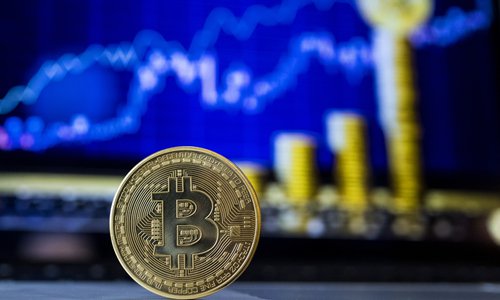Former Chinese banker urges that digital currency substitutes all currencies
Former Chinese banker supports digital currency

A visual representation of the digital cryptocurrency Bitcoin Photo: AFP
Digital currency should substitute all currencies as much as possible to support profound monetary operation reforms, an influencer in China's financial sector said over the weekend.
The push for digital currency might start with positioning it as a substitute for M0, or cash in circulation, but it shouldn't be confined to such substitution; otherwise, its market competitiveness could be problematic, Wang Yongli, director of Haixia blockchain research institute and former vice president of Bank of China, said in an article posted on his public WeChat account.
Many economies have been actively exploring the creation of fiat digital currencies; for example, China's central bank has entered the pilot stage of its Digital Currency Electronic Payment (DCEP). The DCEP is envisioned to mainly replace M0 and designed to adopt a dual operational regime linking the central bank, commercial banks and social entities, but the central bank has yet to disclose specifics for the operational regime.
The central bank-backed digital currency project will be an accelerator for a "dual circulation" approach to China's economic development, Cheng Shi and Qian Zhijun, economists at ICBC International, said in a research note sent to the Global Times.
Dual circulation - a buzzword that has become popular recently in China - is seen as calling both domestic and global markets into play to reinvigorate the economy.
The digital upgrade of monetary policy, underpinned by the DCEP, would avoid the nation falling into a liquidity trap and therefore improve the efficacy of a countercyclical fine-tuning. What's more, the DCEP facilitates the creation of a yuan-denominated "electronic currency zone" that consequently reduces external policy interference and maintains policy independence, the economists commented.
Wang proposed that the new digital currency should be relied on to reshape the monetary mechanism. A possible choice for creating the new digital currency framework could be the direct setup of exclusive "basic accounts" on the central bank's digital currency platform by all social entities, as part of plans to enable the central bank's omnipresent supervision of digital currencies without causing a huge impact on the current financial system, according to his article.
The former banker suggested that the central bank will improve monetary policy effectiveness accordingly. A continued, grossly excessive issuance of money will be prevented, thereby maintaining monetary and financial stability.
But Cao Yin, managing director of the Shanghai-based Digital Renaissance Foundation, warned against the quick replacement of M0 with DCEP.
"The nation still needs cash reserves and there are user scenarios in which the use of cash still takes hold, particularly among the older population," Cao told the Global Times on Sunday.
He also addressed security concerns about a hasty substitution, which might subject the financial system to malicious attacks and over-issue in cases of hacking. Additionally, the telecoms infrastructure to ensure secure payments with digital currency means the substitution requires much more than the current cash usage in terms of security.
Endorsing the central bank's staged approach to pilot the DCEP initially in certain user scenarios and in a selection of cities, Cao remarked it would be earlier for the central bank to partner with Alipay and WeChat by setting DCEP as one of the payment conduits available in the two mobile payment behemoths.
The central bank can establish an interface for DCEP without question in technical terms, but it won't be easy for its proprietary interface to be as commercially successful as Alipay or WeChat, he added.




